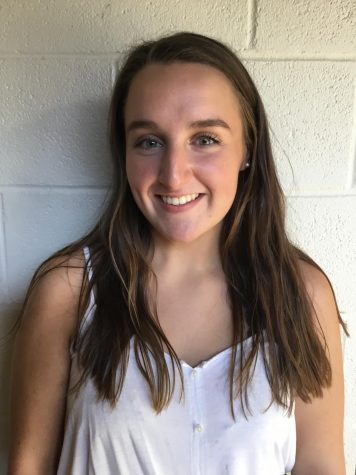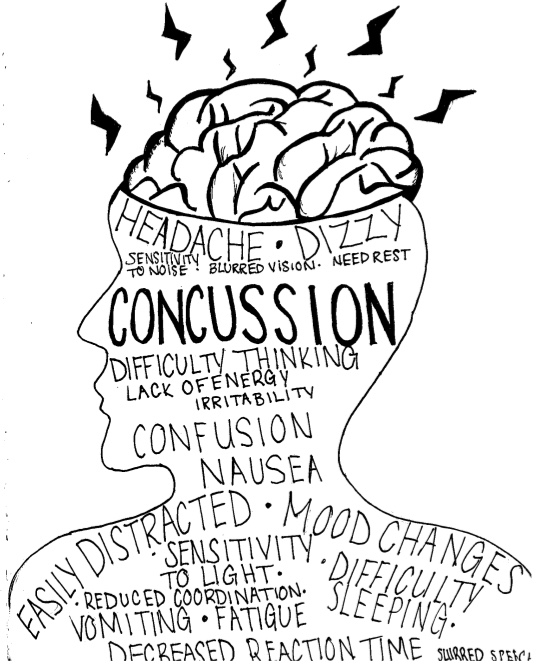Bruised Brains: More than the Eyes Can See
A concussion: What it feels like
Imagine sitting in class, trying to concentrate, but the thud in your head just can’t stop. Boom, boom, boom. Every little sound is ten times louder and the lights seem brighter than they really are. You want to stay focused, so you don’t fall behind, but your brain keeps telling you to take a break. Even doing the simple daily tasks is harder than it used to be. What is my locker combination again? Why can’t I remember how to solve this algebra equation? Does it seem like the teacher is giving the notes much faster than he/she usually does? This is a concussion. As I write this, I am in the process of recovering from my third concussion. By definition, it is a brain injury caused by a blow to the head or a violent shaking of the head and body.
I got my first concussion in sixth grade. Our parents always tell us no horseplay, because someone will get hurt, and for some reason, it always ended up being me. My sister accidentally kicked me in the head during a tussle. After a scan was taken of my head, the doctor told me that I had a concussion. Rest and lots of fluids were my instructions. My recovery time took about three weeks, so it was nothing drastic, except that I was a rambunctious sixth grader that always kept on going.
My second concussion occurred in ninth grade, taking a basketball to the head during a game. I went to see Dr. Stephen Mills who informed me that I had a mild concussion, and I was lucky because it could have been a lot worse. Concussions have three grades: mild, moderate, and severe. Mild is where symptoms have the least effect, moderate is when the symptoms have a more lasting effect on the brain post-injury, and severe is when the injury is so traumatic that the person can lose consciousness. After my diagnosis, Dr. Mills told me that I was out for rest of basketball season, to let my brain heal properly.
My third concussion I am still recovering from. At the end of my senior volleyball season that was record-breaking for Greater Latrobe, I was hit in the head with a spiked volleyball. At this point, I knew all of the precautions I had to go through, I got evaluated by the trainers at the school [Nick and Kaitlyn.] I had to take my impact test, which would track memory, reaction time, etc. They referred me to see Dr. James Masterson, one of the best concussion specialists in the area. Dr. Masterson gave me the diagnosis of a moderate concussion. I am still in the process of being cleared, taking new and updated impact tests with every visit.
I am most sensitive to light and noise. It could be in a classroom, having music playing as background noise, or even just the clicking of a pen. Chaos can cause the block in your brain, or your mind will try to focus on the littlest things that can annoy you the most. Lights such as computer/phone screens or walking from a dark room to a bright room can cause a lot of pain for a concussed person. Concussions have such a far range where you feel really great one day, and the next could be your worst.
Senior Ava Avolio is currently recovering from her second concussion. She received her first in eighth grade from a header off a punt in soccer. Her second concussion was this fall during field hockey season. “I was running at a ball and a girl shouldered me in the head,” said Avolio.
Avolio is going to Dr. Masterson for her treatment. Her main symptoms were eye tracking, dizziness, and nausea. Avolio also needed vestibular therapy [eye therapy] for her symptoms, which she is getting through Excela.
“My biggest issue in school was always having to take notes on my computer,” Avolio said, “So much screen time took a strain on my eyes.”
Concussion patients are recommended to stay off of screens as much as possible while recovering in order to not strain the eyes. This has gotten to be a bigger problem over recent years with all of the new technology usage inside and outside of school.
Avolio’s was diagnosed with her second concussion in early October and was just cleared in mid-November. Her first concussion took about three months for her to be completely healed, due to the problems she had with her eyes. “All of my vision tracking was abnormal, such as my horizontal and vertical saccades. My pursuit movements were also off,” Avolio said.
“Any brain injury is always concerning, it can lead to lifelong problems,” said Mrs. Kim Avolio [Ava’s mother.]
Senior Colvin Stallings is another student who has been impacted by concussions. Stallings has had several concussions starting at a young age, most of which came from sports [football, basketball, lacrosse.] However, Stallings was in a car accident last year, where he received his last major concussion. He went to Dr. Masterson for his treatments, and his recovery time ranged from 2 weeks to 6 months.
Concussions are an unknown guessing game, and that is what some people do not understand. As patients, we receive a treatment plan that includes an academic plan for a reason. It is not something to be ignored, because what is at stake is our brains. If concussion patients need extra time for an assignment or an exam, we are supposed to be granted that time. Some other students might view it as special treatment or teachers picking favorites, but it is only so these students do not put too much stress on their brain in one period of time. If there is too much stress on a concussed brain, the recovery process could be dragged out longer, and the patient’s symptoms could become much worse than they are.
As teenagers and young adults, we need to be well informed on what a concussion is, because it heavily affects people ages fourteen to eighteen. It is not something to take lightly, because if it is missed or ignored, major problems could arise in the future.
Be careful and always try to avoid injury. Look out for those who have concussions, support is the best medicine!

I am a senior at Greater Latrobe this year, and this is my first year being on The High Post Staff. I am very excited to be writing for the paper, and...


